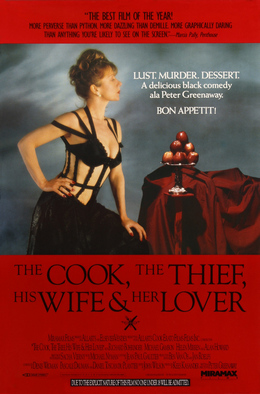Movie: The Long Good Friday (John Mackendrick, 1980) (Criterion Collection).
Book: William Shakespeare, Troilus and Cressida, ed. Kenneth Palmer.
TV: Holiday Baking Championship: Ultimate Holiday Party (Food Network); The Rachel Maddow Show (MSNBC); Maid: Sky Blue (Netflix); Station Eleven: A Hawk From a Handsaw (HBO Max).
Every actor has to start somewhere, so it's fun to see Pierce Brosnan as "1st Irishman" in The Long Good Friday, a role that gives him no lines but a couple of key moments in the unfolding of the plot. It was only his second screen appearance and his first in a theatrical film, but it's clear to see that the camera loves him. He's cast as a killer, seducing and stabbing a gay henchman of London mob boss Harold (Bob Hoskins). The plot of The Long Good Friday is complicated in the manner of such noir thriller writers as Raymond Chandler: Harold wants to go semi-straight with a property development that he bloviates will make London the capital of a new Europe, but he needs funding, so he invites a New Jersey mafioso, Charlie (Eddie Constantine), to attend a big presentation of his plans for the project. Somehow, however, things don't go as he hoped. In addition to the murder of his man Colin (Paul Freeman), Harold's mother narrowly escapes death when her Rolls-Royce is blown up, killing the chauffeur. And when he tries to take Charlie out to dinner at a pub Harold owns, it blows up just before they arrive. There's no Philip Marlowe on hand to figure out who's out to get Harold, so he has to do it on his own, with the help of his mobsters, one of whom, of course, is disloyal. The plot twists eventually involve the IRA, some stolen money, and a corrupt cop, among others. Hoskins is wonderful in the role, and the ending, in which he finds himself hoist with his own petard, is a tour de force: an extended closeup in which Hoskins's face reveals the range of emotions he's experiencing, from fear to frustration to desperation. Helen Mirren is cast as his ... I suppose "mistress" is the word, a role that doesn't give her enough to do, but she does that little bit brilliantly.
 |
| Bob Hoskins and Helen Mirren in The Long Good Friday (John Mackendrick, 1980) |
Station Eleven jumps 20 years ahead in its second episode, with Kirsten (Mackenzie Davis) grown up and touring the pandemic-blighted landscape with a touring group of Shakespeare players. But the series keeps jumping back to the days of the outbreak, with young Kirsten (Matilda Lawler) living in the high-rise apartment of Jeevan (Himesh Patel) and his brother, Frank (Nabhan Rizwan). There's a stunning sequence in which Kirsten plays Hamlet with the company, her lines triggering flashbacks to the moment when she learned of the death of her family. This is shaping up to be a rich and often weird series.


